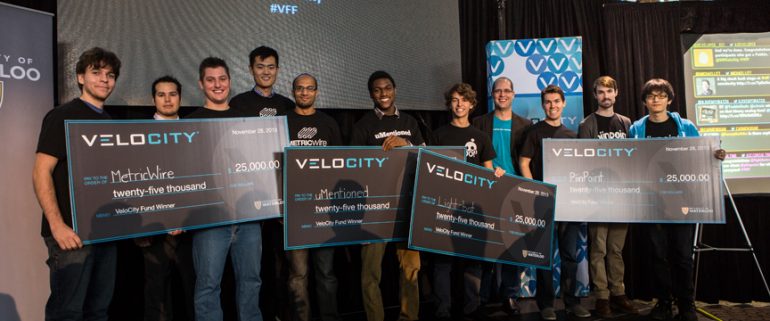The University of Waterloo’s eighth VeloCity Fund Finals was one to remember, with four student startups taking home $25,000 to pursue their business idea, as well as record crowds.
More than 400 people looked on as ten startups competed for one of the four sweet grants.
The four winners of the grants worth $25,000 are:
Light-bot – Gets kids interested in computer science by playing games.
MetricWire – Accelerates groundbreaking academic research by making it easy to collect rich scientific data via smartphones.
uMentioned – A college location-based app that lets you anonymously chat and make new friends with people nearby.
PiinPoint – Uses demographic, real estate, traffic and municipal data to identify optimal new store locations for retailers.
“I’m ecstatic. $25,000, no equity,” said Danny Yaroslavski, the founder of Light-bot. “The funds will go directly into hiring developers and getting Light-bot into schools as quickly as possible.”
Brian Stewart of MetricWire added that his startup will use the $25,000 to hire more developers. “For now, I have to get back to VeloCity Garage and keep working,” he said. MetricWire provides a solution for researchers to be able to collect data for their studies using mobile devices instead of paper, also came away a winner.
Each team had three minutes to pitch their start-up ideas to a panel of judges, including Karam Nijjar of iNovia Capital, Cameron Hay of Front Burner Consulting, Mike Kirkup, director of VeloCity and Mike Stork, president at Stork Holdings. At least one founder on a pitching team must be a current student or a graduate of the University of Waterloo within the past year. As Yaroslavski indicated, the VeloCity takes no intellectual property rights or equity in return.
As well as the $25,000 grants, ten students at the University of Waterloo also had the chance to grab $1000 prizes for their startup ideas.
PetroPredict, which won both best pitch and people’s choice, is an oil well integrity prediction engine for the oil and gas industry. It enables subsurface engineers to identify low-capital, high-reward opportunities in their fields.
Helios won a grant for being most innovative. The company developed a technology that continually charges the battery of a cellphone throughout the day using sub-pixel solar cells embedded into the display. These solar cells will be unnoticeable to the naked eye during usage, and will channel energy from ambient light to charge the cellphone.
The other finalists competing for the grants worth $25,000 were:
GamePress – Users create fun mobile games without any programming experience and share them with users around the world.
Realtime Labs Inc. – Real-time audience feedback technology for a variety of industries, including education and entertainment.
Sesame IO – A free online service that streamlines a teacher’s day from lesson planning to capturing student work into personalized portfolios for assessment.
SparkGig – An online marketplace to connect performers with event planners.
TrendRadius – A tool for consolidating information inside an organization and helping product managers make informed decisions.
Velatron Labs Inc. – A personalized tailoring app that helps you find or order perfectly fitting clothes online.
“I continue to be impressed by the level of talent vying for these grants,” said Stork, on the of the judges. “It’s exciting to see these teams make their pitch to grow their companies and I look forward to them being successful.”



